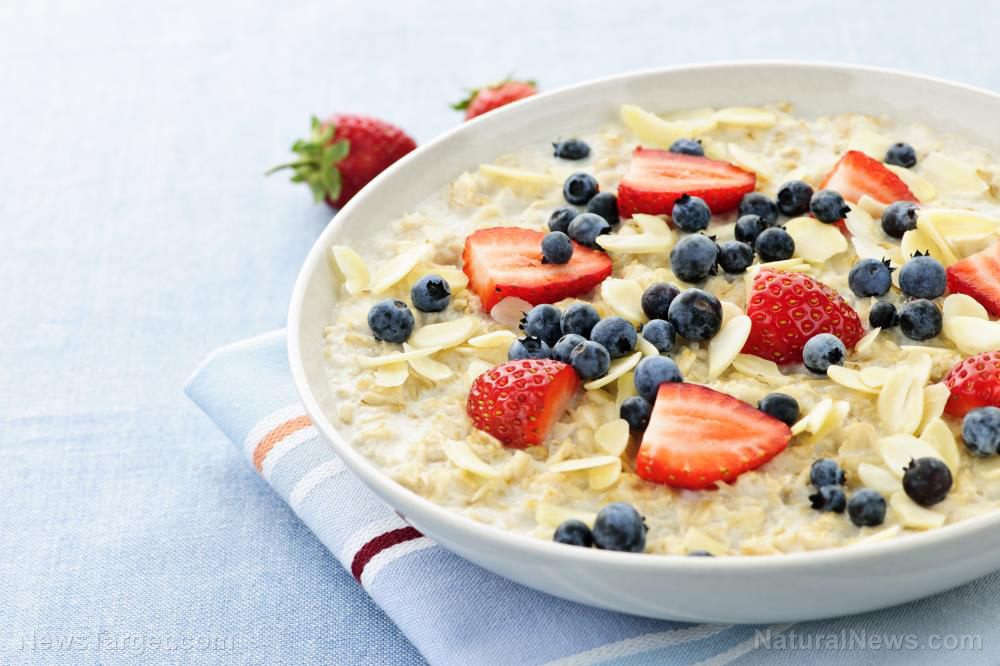by Joanne Washburn
Oats are a great breakfast option. Prepared as oatmeal, these filling and nutritious grains offer some major health benefits thanks to their fiber, protein, calcium, thiamine, iron and other essential nutrients.
This incredible nutritional profile shouldn’t come as a surprise since oats are among the healthiest grains on earth. Plus, these gluten-free grains are a great source of antioxidants that can help fight chronic diseases.
Reasons to eat oatmeal
Let’s face it: plain old oatmeal isn’t the best breakfast food because of its blandness and texture. But don’t let that keep you from avoiding it altogether. Numerous studies attest to oatmeal’s reported health benefits. Plus, there are tons of recipes out there to help you get around that boring milk-and-oats combo.
– Oats support heart health – The soluble fiber in oats signal the liver to get rid of all that bad cholesterol in the bloodstream. This kind of cholesterol can clog our arteries and heighten our risk of heart disease. In addition, antioxidants in oats, such as avenanthramides, can fight chronic inflammation linked to heart disease.
– Oats boost the immune system – Oats are immune-boosting foods. Their beneficial effects on the immune system are all thanks to their natural sugars, called beta-glucans. These sugars help boost our infection-fighting immune cells. Minerals like selenium and zinc in oats are also essential nutrients for fighting infection and disease.
– Oats help keep blood sugar stable – Besides reducing bad cholesterol, beta-glucans also aid in regulating blood sugar. Numerous studies also confirm that soluble fiber in high-fiber foods stalls the digestion of food in the intestine, thus keeping blood sugar from spiking after a meal. In fact, recent research suggests that oats intake has a beneficial effect on glucose control in diabetic patients.
– Oats regulate appetite – The fiber in oats helps keep us feeling full for longer periods. In fact, just half a cup of oats should keep us full until the next meal.
– Oats support gut health – Fiber-rich oats also make it easier to pass stool, thus minimizing the risk of constipation. In addition, increased fiber intake is linked to a reduced risk of colon cancer.
– Oats make for a balanced breakfast – One cup of cooked oatmeal contains about 150 calories, four grams of fiber (soluble and insoluble) and six grams of protein. Oats are also often cooked in butter or milk to increase their protein and nutrient content.
– Oats can be incorporated into other dishes – Shocking as it might sound, oats aren’t just for making oatmeal. These gluten-free grains can be combined or paired with other foods, including fruits, salad greens, spices and even last night’s leftovers.
Oatmeal recipe for breakfast
The classic milk-and-oats combo can get tiring after some time. But instead of grabbing some other food for breakfast, use these recipes instead for a fun spin on the classic oatmeal.
Steel-cut oatmeal
Steel-cut oats, or Irish oatmeal as it is also called, are perhaps the closest you can get to the original, unprocessed oat groat. These oats are the perfect building block for an ultra-nutritious breakfast.
Ingredients:
- 3 cups boiling water
- 1 cup steel-cut oats
- 1/2 cup whole milk
- 1/2 cup plus 1 tablespoon low-fat buttermilk
- 1 tablespoon butter
- 1 tablespoon sugar
- 1/4 teaspoon cinnamon
Preparation:
- In a large saucepot, melt the butter, then add the oats.
- Stir for 2 minutes or until the oats are toasted.
- Pour in the boiling water and reduce the heat to a simmer.
- Keep it at a low simmer for 25 minutes without stirring.
- Pour in the milk and half of the buttermilk with the oatmeal.
- Stir to combine and cook for 10 minutes.
- Transfer the oatmeal onto a bowl and top with the remaining buttermilk, sugar and cinnamon.



